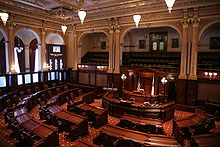Illinois Senate

The Illinois Senate is the upper chamber in the Illinois General Assembly, the legislative branch of the government of the state of Illinois. Created in 1818 by the constitution of the first state, the Illinois senate is comprised 59 senators elected from individual legislative districts determined by population. According to Illinois' 1970 constitution, senators are divided into three groups, each group having a two-year term at a different part of the decade between censuses, with the rest of the decade being taken up by two four-year terms.[1] Depending on the election year, roughly one-third, two-thirds, or all Senate seats may be contested. In contrast, the Illinois House of Representatives is made up of 118 members with its entire membership elected to two-year terms. House districts are formed by dividing each Senate district in half.[2]
Powers
[change | change source]The Illinois Senate meets at the Illinois State Capitol in Springfield, Illinois. It is required to convene on the second January of each year.[3] Along with the Illinois House of Representatives and The Governor of Illinois, it is vested with the power to make laws, come up with a state budget, act on federal constitutional amendments, and propose constitutional amendments to the state constitution.[4] The Illinois Senate also holds the power to convict impeached executive and judicial officials with a 2/3 majority vote.[5]
By party
[change | change source]| Affiliation | Party (Shading indicates majority caucus) |
Total | ||||
|---|---|---|---|---|---|---|
| Democratic | Republican | Conservative | Vacant | |||
| End of previous legislature | 40 | 19 | 0 | 59 | 0 | |
| Begin | 37 | 22 | 0 | 59 | 0 | |
| April 19, 2018[6] | 21 | 1 | ||||
| January 7, 2019[7] | 40 | 19 | 0 | 59 | 0 | |
| Latest voting share | 67.8% | 32.2% | 0% | |||
Future Senate Elections by District
[change | change source]State Senators will be elected in the legislative districts for terms of office as set forth below.
FIRST GROUP (Districts 2, 5, 8, 11, 14, 17, 20, 23, 26, 29, 32, 35, 38, 41, 44, 47, 50, 53, 56, 59)
2026 -4 Years
2030 - 2 Years
SECOND GROUP (Districts 3, 6, 9, 12, 15, 18, 21, 24, 27, 30, 33, 36, 39, 42, 45, 48, 51, 54, 57)
2026 - 2 Years
2028 - 4 Years
THIRD GROUP (Districts 1, 4, 7, 10, 13, 16, 19, 22, 25, 28, 31, 34, 37, 40, 43, 46, 49, 52, 55, 58)
2028-4 Years
References
[change | change source]- ↑ Constitution of the State of Illinois ARTICLE IV Section 2 (a) Illinois General Assembly Retrieved April 24, 2011.
- ↑ Constitution of the State of Illinois ARTICLE IV Section 2 (b) Illinois General Assembly.
- ↑ Constitution of the State of Illinois ARTICLE IV Section 5 (a) Illinois General Assembly
- ↑ Constitution of the State of Illinois ARTICLE IV Illinois General Assembly
- ↑ Constitution of the State of Illinois ARTICLE IV Section 14 Illinois General Assembly
- ↑ Sam McCann (District 50) switched parties from Republican to the Conservative Party, which McCann created for the purpose of running for governor.
- ↑ "Illinois Democrats will have historic majorities". WQAD.com. 29 November 2018. Retrieved 21 January 2019.
